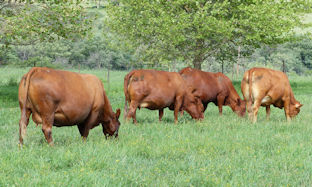
BEEF COW MANAGEMENT PRE CALVING: General Management Aspects
This is article 7 of 7 articles on this topic
The last two months before calving is probably one of the most important periods in the production cycle to ensure success. This not only affects the successful birth of a calf with a strong survivability, but also what happens to the calf and the cow after the birth process, to the success of the coming breeding season and even up to and including weaning time.
GENERAL MANAGEMENT ASPECTS
A few general management actions that can be addressed during this time are the following:
-
If possible / practical, now is a good time to class the cows according to condition or calving herds. (Adjust the feeding of the cows to be at a condition score of at least 3.5 by the start of the calving season ).
-
Make sure there is enough space available at lick bins to reduce competition as far as possible. Also make sure that licks are available at all times.
-
Work as calmly as possible with pregnant cows to reduce stress. Avoid bruises or injuries during handling that could lead to abortions. Handling facilities must be of such a standard to make this possible. Workers must also be trained to work with the animals as calmly as possible. Cows should be quietly driven to and from the handling facilities. Clean drinking water must be available nearby at all times. If cows have to spend the night in exceptional conditions in the kraal, fresh drinking water and feed (hay) must be available.
-
In the meantime, plan the calving camps and make sure that the fences and water supply are in order. If the calves are to be given creep feed, make sure that the feeding troughs and creep gates are in order.
-
Watch out for abortions in late pregnancy. Any aborted fetus should be taken to the vet as soon as possible and sent away for examination to try to determine the cause. Especially in first calving heifers, abortions can be an indication of contagious abortion! (Thereafter, the cows usually calve normally)
-
Be aware of the occurrence of metabolic disorders such as milk fever in late pregnancy.
-
Make sure that the “first aid kit” contains the most important remedies to treat the most common conditions before and during calving:
-
Suppositories (antibiotic effervescent pills) to prevent uterine infection after difficult births (Obermycin Foaming Pessaries)
-
Remedies to treat diarrhea in newborn calves e.g. electrolytes
-
Antibiotics to prevent/treat common infections - tetracycline (Terralon® LA) or sulfa (Sulmetrim Plus NF) based drugs as first line treatment.
-
Inflammatory drugs (relieving pain and fever) - only available from your veterinarian
-
A drug to treat milk fever
-
An iodine preparation to prevent umbilical cord infections - especially when calving in kraals or confined areas (Oberdine Wound, Eye and Footrot Spray)
-
Disposable syringes and needles
-
Plastic gloves for use during difficult births
-
6009230802DVN

